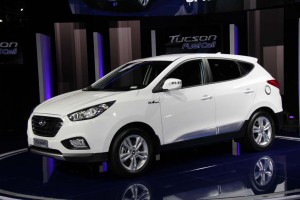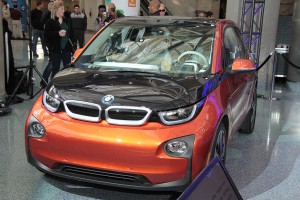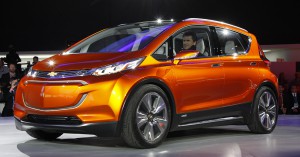
The fuel-cell version of the Hyundai Tucson will be offered through the new BeeZero car-sharing program in Munich.
Wondering what it’s like to drive a fuel-cell vehicle? For now, only a handful of qualified buyers living in a handful of communities in Southern California, Japan and Europe can find out, due to the limited availability of hydrogen and the low number of vehicles capable of using that super-clean fuel.
But if a new venture starting up in Munich, Germany is any indication, lots more motorists will get the chance to test drive hydrogen cars in the near future. And similar car-sharing programs opening up everywhere from Beijing to Indianapolis are offering motorists the opportunity to try out battery-cars like the Smart Electric Drive.
While only a small percentage of motorists have yet signed up to participate in car-sharing programs like ZipCar, Car2Go, BlueIndy or BeeZero – the latter offering Hyundai Tucson Fuel Cell vehicles in Munich, industry analysts anticipate rapid growth in the coming years. And a growing number of automakers are looking to participate in a potentially industry-transformative shift.
(Growing number of Americans skipping their licenses and finding alternate transportation. Click Here for the story.)
Among the newest entrants is Jaguar Land Rover, which today announced a new technology business called InMotion. It plans to begin testing new apps that could allow the British-based carmaker to start car-sharing services in North America, Europe and other parts of the world.
“With the development of new apps and on-demand services, InMotion provides us with an opportunity to provide engaging and invaluable experiences to both new and existing customers globally,” explained global strategy director Adrian Hallmark.
BMW, meanwhile, is setting up a new car-sharing service called ReachNow, which will make its debut in Seattle and then expand into other markets. It’s an updated version of the DriveNow car-sharing service that BMW was offering in San Francisco until recently.
ReachNow will offer several different BMW models, including the 3-Series, as well as the i3 electric vehicle. That fits with what a number of manufacturers are doing, whether they operate their own car-sharing programs or provide vehicles for services operated independently. Automakers such as Ford and Daimler AG have been using car-sharing services to show off their new, green vehicles, giving potential buyers the chance to see if the new technologies meet their needs.
The BeeZero program is operated by Lindem, a multinational company that provides a variety of industrial gases, including hydrogen.
“We expect to gain valuable information from day-to-day fleet operations which we will use to further develop our hydrogen technologies and to help expand the hydrogen infrastructure,” noted Linde Executive Board member Christian Bruch.
(For a look at the Tesla Model 3, Click Here.)
Car-sharing services allow licensed drivers the opportunity to rent vehicles on short notice, often for runs of as little as a half-hour. They follow a model more similar to the bike rental operations popping up in major cities than to classic daily rental car services like Hertz. In Seattle, for example, BMW’s ReachNow will position 370 vehicles at street corner locations around the city.
While ReachNow will initially focus on car-sharing, it may later take on ride-sharing programs like Lyft and Uber, BMW said.
These taxi and limo alternatives are gaining traction even faster than car-sharing, and that has prompted a number of automakers to see how they can participate in ride-sharing, as well. Perhaps the most aggressive moves have been made by General Motors which, in January, announced it would invest $500 million in Lyft, while also purchasing the bankrupt San Francisco-based Sidecar. (GM also announced plans to set up a new car-sharing service, Maven.)
Last month, GM revealed that it would take steps to move Lyft drivers into its own vehicles, setting up a program called Express Drive. Initially, they’ll be able to arrange short-term leases of the Chevrolet Equinox for as little as $99 a week, including insurance and maintenance.
But later this year, GM officials have hinted in conversations with TheDetroitBureau.com, they will add the new Chevy Bolt battery-electric vehicle. Having that long-range battery-car in wide use could help “change the conversation,” by exposing more potential buyers to the Bolt, explained Pam Fletcher, head of GM’s battery-car operations.
(Driving the almost production-ready Chevy Bolt. Click Here for a review.)


